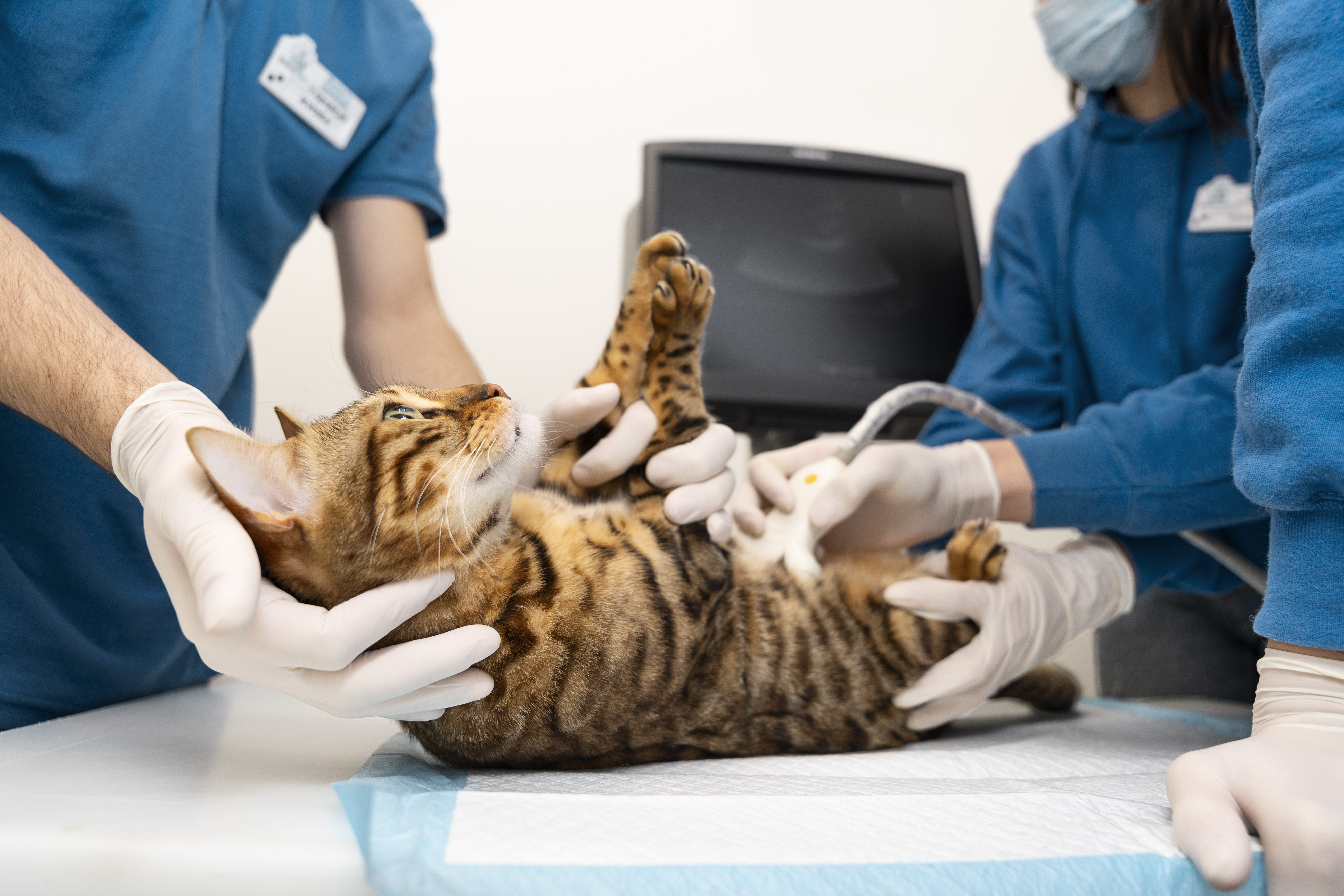
A cat abdominal ultrasound is an important tool that helps veterinarians find health problems that may not show any signs. Many cats hide discomfort until a disease becomes serious. Ultrasound lets vets see inside a cat’s body, spot issues early, and plan the right treatment to keep your pet healthy. Even cats that eat well and appear active can have underlying problems. Conditions such as kidney disease, liver inflammation, or intestinal issues often develop silently. By using ultrasound, veterinarians can detect these conditions before your cat experiences pain or other obvious signs, giving your pet the best chance at long-term health.
How Ultrasound Shows What You Can’t See
Ultrasound uses sound waves to create pictures of your cat’s organs and soft tissues. Unlike X-rays, it can show details of the liver, kidneys, spleen, bladder, and intestines in real time. This helps vets find problems like tumors, fluid buildup, or organ inflammation before they cause visible symptoms.
For example, a small tumor in the liver may not affect a cat’s behavior or appetite at first. Using ultrasound, the vet can find it early and plan the best treatment before it grows or causes serious complications. This proactive approach reduces risks and improves outcomes.
Finding Organ Problems Early
Cats often hide signs of illness. Early kidney disease, liver inflammation, or intestinal problems may not change a cat’s behavior at first. A cat abdominal ultrasound can find these issues early, allowing vets to start treatment before the disease becomes serious.
Even minor changes detected during imaging can guide preventive measures. For instance, if a kidney cyst is identified early, dietary changes and monitoring can slow disease progression. Similarly, liver lesions detected in the early stages can be treated before they cause organ failure. Early intervention often means simpler treatments and better long-term results.
Planning the Right Treatment
When a problem is found, ultrasound gives vets clear information about its size and location. This helps guide surgery or medical treatment accurately. It reduces risks, speeds up recovery, and ensures your cat gets the right care without guessing.
Ultrasound also helps determine whether a condition requires immediate action or careful monitoring. This prevents unnecessary procedures and stress for your cat while making sure nothing serious is overlooked. For example, a mass in the abdomen can be tracked over time, giving vets the information needed to choose the safest treatment.
Keeping Track of Chronic Illnesses
Cats with long-term conditions, such as kidney disease or heart problems, benefit from regular ultrasounds. The test lets vets check how organs are doing, watch disease progress, and adjust medicine as needed.
Routine imaging allows veterinarians to compare results over time. This comparison makes it easier to notice subtle changes that could indicate worsening or improvement. For owners, this means fewer surprises, fewer emergency visits, and better quality of life for their cat.
Painless and Stress-Free for Cats
Abdominal ultrasound is safe and does not hurt your cat. Most cats handle it well with very little restraint. Sometimes mild sedation is used to keep anxious cats calm.
Cats can usually go home the same day without any recovery time. This makes ultrasound a highly effective and low-stress tool for both routine wellness checks and monitoring ongoing health issues.
Preventive Care Starts with Ultrasound
Adding a cat abdominal ultrasound to regular health exams improves preventive care. Combined with lab tests, physical exams, and vaccines, it gives a full picture of your cat’s health.
Vets can offer personalized advice based on what they see in the imaging. For example, they may recommend changes in diet, hydration, or exercise to support kidney or liver function. By addressing potential issues early, preventive care can extend your cat’s life and reduce medical costs over time.
Early Detection Can Save Lives
The main benefit of ultrasound is finding diseases before your cat shows symptoms. Detecting kidney problems, liver issues, or tumors early allows treatment to start quickly.
Early care reduces medical costs, prevents emergencies, and helps your cat stay active and happy. It also gives owners peace of mind, knowing they are taking steps to protect their pet before problems become serious.
Closing Note:
At Fraser MacDonald Animal Hospital, we use advanced imaging and expert veterinary care. Our cat abdominal ultrasound service helps us find hidden health issues before they become serious. Together with a Medicare wellness exam, we provide full, personalized care for every cat. We understand that each cat is unique, and our team takes the time to review results, explain findings, and create care plans tailored to your pet. By combining early detection, preventive care, and expert guidance, we ensure that your feline companion receives the best possible care at every stage of life.
Book an ultrasound today with our skilled team. At Fraser MacDonald Animal Hospital, we focus on early detection, careful treatment, and ongoing support to keep your cat healthy, happy, and safe.
FAQs:
It helps vets examine internal organs and detect hidden diseases before symptoms appear.
Yes, it is non-invasive, painless, and usually requires minimal restraint or mild sedation.
Yes, it identifies small changes in organs, allowing early treatment and better outcomes.
Cats at risk or with chronic conditions may benefit from annual or periodic ultrasounds.
No, it complements exams, lab tests, and vaccines for complete preventive care.